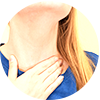
Angina is an infectious inflammatory disease of the tonsils transmitted by droplet infection. It is most often caused by bacteria (mainly Streptococcus or Staphylococcus), less often by viruses and yeasts. The risk of infection is higher in case of weakened immunity, stress or sudden weather changes.
Symptoms:
A special case is scarlet fever, which is manifested at first by a whitish-coated tongue (after a few days it becomes raspberry red), a rash (mainly in the lower abdomen, chest and limbs). It is more common in children's collectives.
Therapy:
If you suspect angina, see a doctor as soon as possible. If they confirm bacterial inflammation (e.g. with a rapid CRP test), antibiotics (most often penicillin series) will be needed for treatment. It is necessary to follow the dosage regimen and the time set by the doctor. Antibiotic treatment should be supported by the use of probiotics (at least 2 hours apart).
Angina of viral origin can be treated without antibiotics and, on the contrary, we will use additional preparations to suppress the symptoms, e.g. pain and fever containing ibuprofen or paracetamol.
Local preparations in the form of lozenges, gargles and sprays will help alleviate the pain in the throat. They mainly have a disinfecting effect, but also antibacterial or anti-inflammatory. After use, it is advisable not to eat or drink for at least half an hour.
There is an abundance of preparations on the market, and the pharmacy will help you choose the most suitable preparation for selected problems.
Don't forget to rest and drink plenty of fluids (e.g. herbal teas), pay attention to increased hygiene (disinfection, mask).
Untreated infection can lead to serious complications (rheumatic fever, abscess). Therefore, it is important to conscientiously follow the treatment regimen and monitor whether the condition worsens.
Free according to the web portal of the Czech Chamber of Pharmacy for the public Lékárnické kapky, 30/11/2023

28. 2. 2026
Annual protective limit for deductible co-paymentsA new system of reimbursement of deductible co-payments for medicines has been in effect for more than a year. Thanks to this ...

31. 1. 2026
eVouchers in practice eVouchers are electronic vouchers for medical devices and, with their functionality, they will mandatorily replace paper vouchers from January 1, 2026.